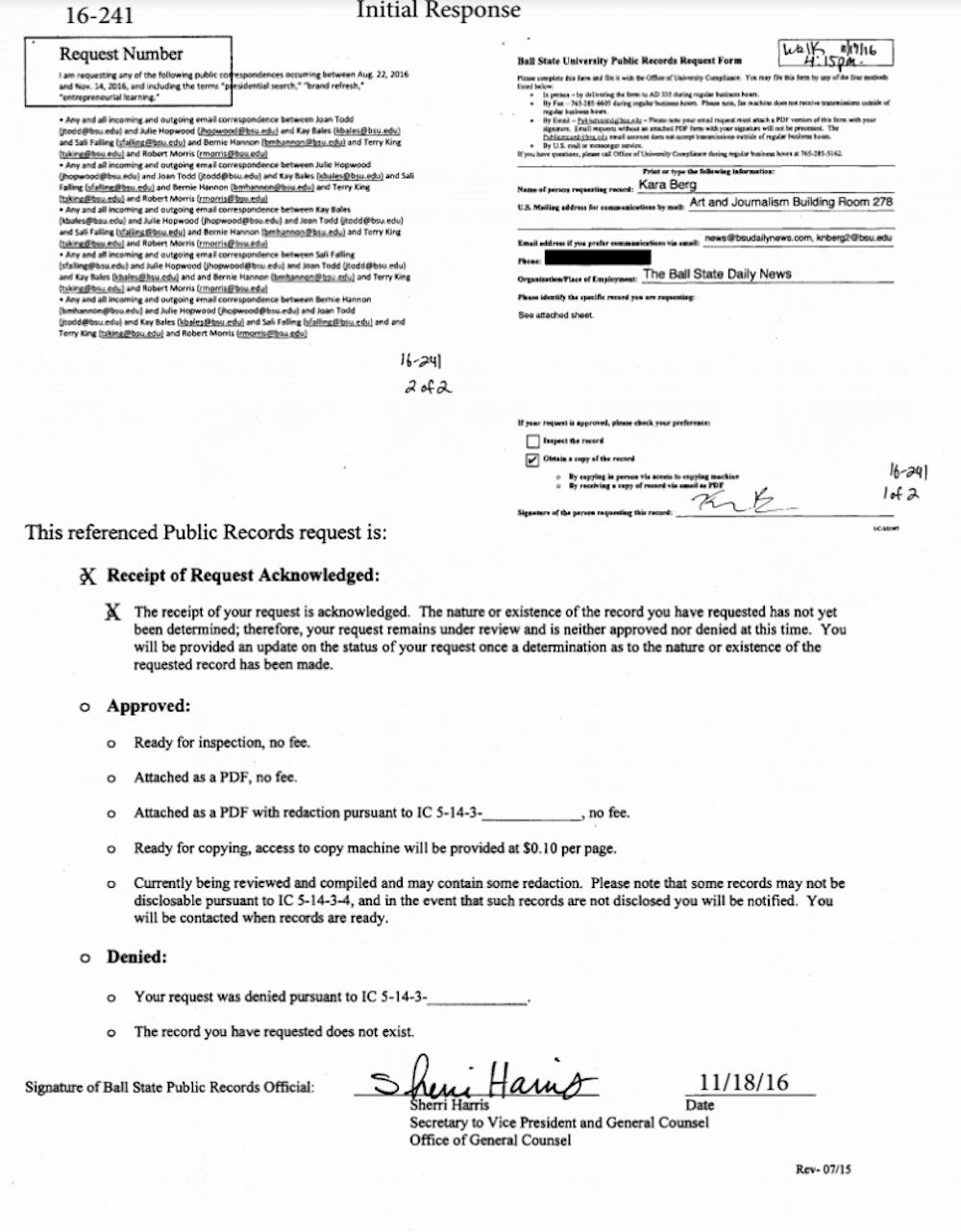Initially when the requests for former president Paul W. Ferguson's emails were made, they were rejected for not being "reasonably specific."
When media outlets narrowed down the requests, adding in key words and who the emails were to and from, the requests were denied because the records "didn't exist."
Ball State does not have a policy to ensure that many forms of public records, including emails, are not destroyed.
Emails are considered public records under Indiana law, but universities are not subject to the same records-retention rules that govern other public agencies. According to state law, the school — and the other public universities — isn't required to have a policy.
Although state universities are government-funded, they don’t fall under the same records retention rules as government agencies do.
Joan Todd, university spokesperson, maintains the university does not have a records-retention schedule, and the lack of a schedule doesn't impact how records are kept. The only policy the university has ensures that personnel records, financial information and travel and attendance records aren’t destroyed.
"The university does not purposefully destroy public records that should be maintained," Todd said. "The university is well aware of the duty to preserve records when, in the regular course of doing business, it is necessary to preserve those records to complete university business or the university is lawfully obligated to do so, such as when records are the subject of litigation."
At Ball State, the issue arose when news organizations including the Daily News, The Muncie Star Press and others sought copies of emails between departing president Paul W. Ferguson and members of the Board of Trustees.
In response to detailed records requests formulated with the guidance of Luke Britt, Indiana public access counselor, and attorneys with extensive experience with the law, the university said it had no emails between Ferguson and any of those figures with the search terms: resignation, resign, sabbatical leave, severance, public announcement, release, Betz + Blevins law firm, voluntary, payment of wages, Bracken House, non-disparagement, cooperation, letter of reference, effective, board, trustees, Rick, Rick Hall, Julie Hopwood, enrollment, Jan. 25, March 25, Indianapolis, Indianapolis center, terminate and president.
The university also denied a request for emails between Todd, Mary Barr, Lisa Renze-Rhodes, Robert Morris and Terry King with the keywords: "The Entrepreneurial University," slogan, tagline, branding, brand, "Education Redefined," entrepreneur, entre, firm, consultant, consulting and Koch.
Gerry Lanosga, president of the Indiana Coalition for Open Government, was skeptical that no emails existed.
“That’s pretty astonishing,” Lanosga said. “I think that’s rather unlikely.”
To Lanosga, the absence of any Ball State mail between the president, his board and top advisors suggested that the mail could have been deleted.
But, according to state law, the school — and the other public universities — isn’t required to have a policy.
Although state universities are government-funded, they don’t fall under the same records retention rules as government agencies do.
Universities are self-policing when it comes to records retention, Britt said. So they aren’t required to have a policy, but also aren’t allowed to destroy public records either.
“There should be a policy in place that spells out when these universities can get rid of something and can delete employee emails,” Britt said.
Ball State doesn’t have this, so there are no set points for how long things need to be kept.
“It’s not a very good situation from a transparency standpoint,” said Jim Corridan, director of the Indiana Archives and Records Administration.
Universities can work with the IARA to develop a retention schedule if they please, Corridan said, but it’s up to them.
And, Corridan said, universities would be able to legally delete records because of the lack of policies.
At both Indiana University and Purdue University, there also isn’t a specific email policy. At IU, the retention policies vary by department, and at Purdue, it’s up to the individual to save emails that need to be kept.
“From my perspective, it would make most sense if public universities had a unified retention schedule so they all did things the same way,” Corridan said. “If they provide citizens of Indiana access, it allows them to hold administrators accountable for their actions. But we’re not quite there yet.”





